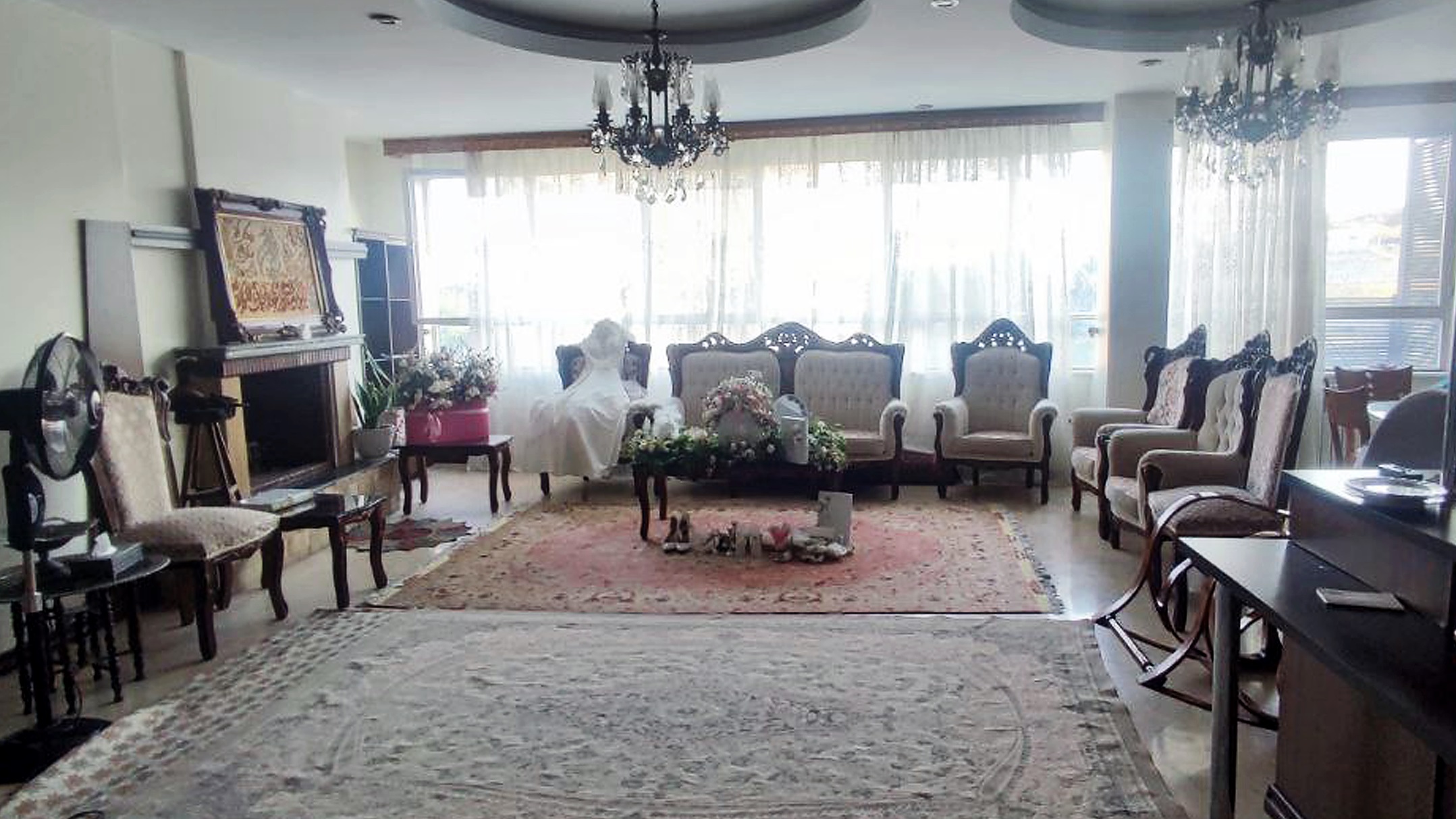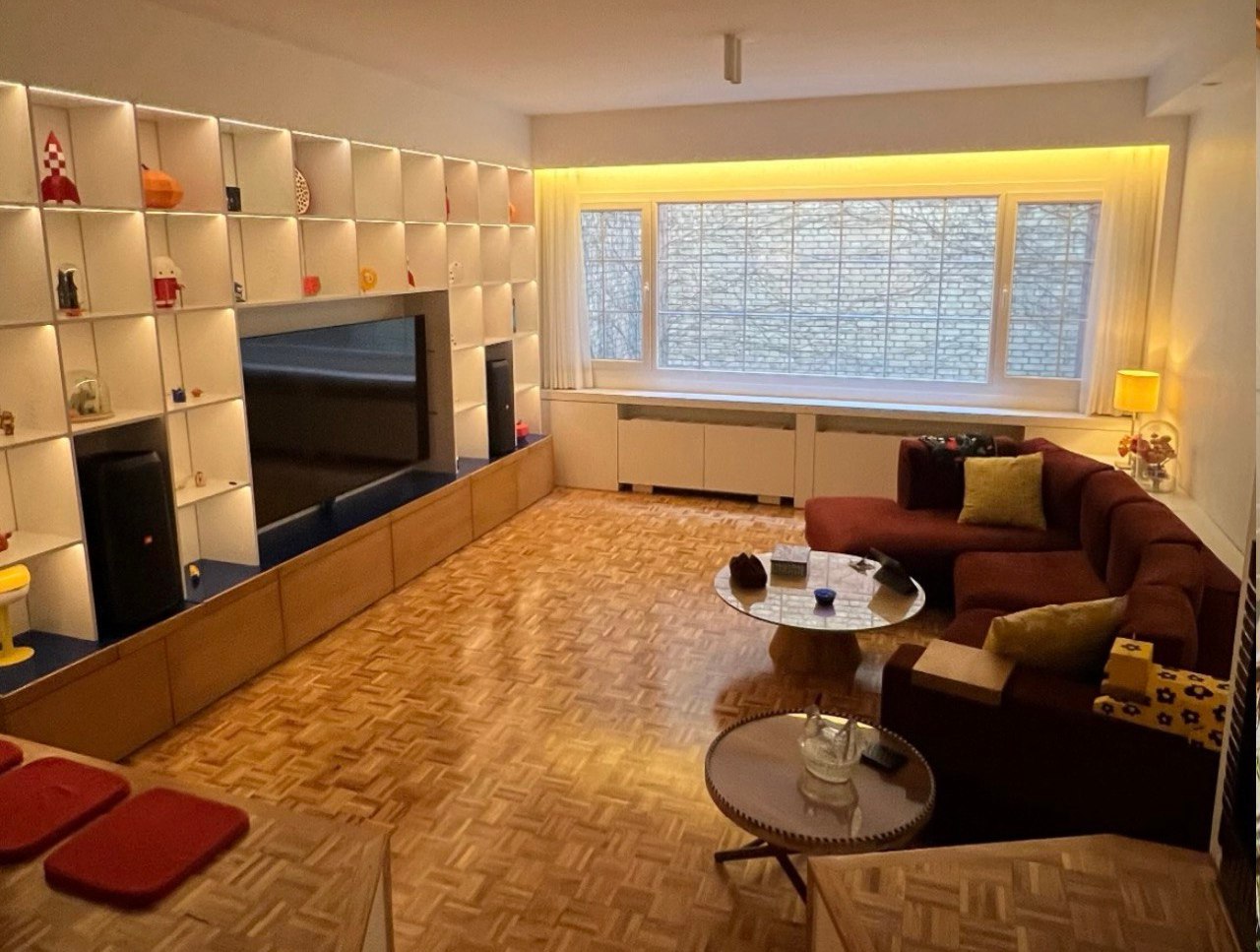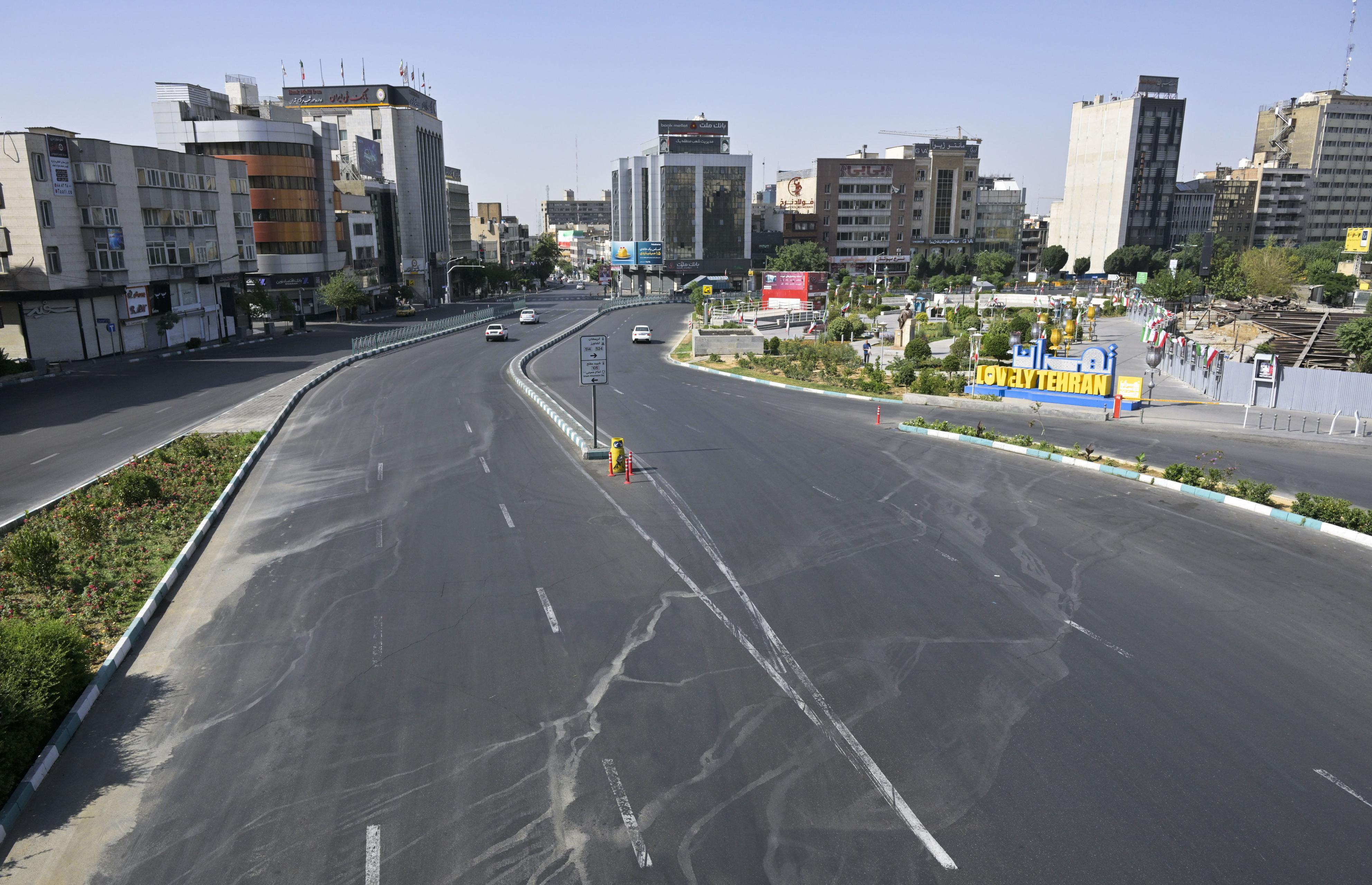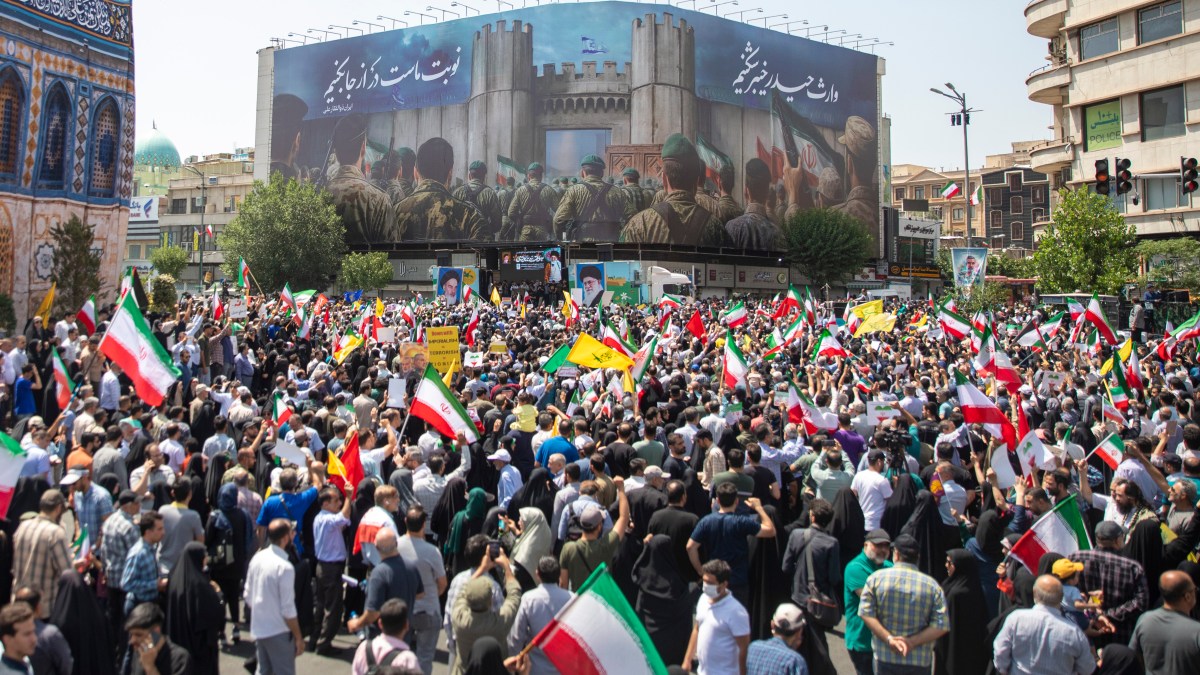Rahna Shams had been looking for the perfect wedding dress for weeks when she found it: long white lace sleeves, a cinched waist and a fishtail skirt. The 23-year-old nursing student had invited guests, arranged the menu and bought a wedding bouquet of white orchids for what would be a big family celebration in Tehran.
Then the war began. Early on June 13, six days before her wedding, Israeli airstrikes smashed into targets across the Iranian capital, killing 78 people, some of them civilians.
She and her fiancé agreed the wedding would still go ahead but then, three days later, a social media post by President Trump sent panic coursing through the city: he called on the ten million people living in Tehran to evacuate immediately.
“My heart sank,” Shams told The Sunday Times over the phone. “At first, I was in shock. I couldn’t believe it. We had waited for this day for months.”
The wedding was off.
Before she left home, she took a photo of her dress and her bouquet laid out on her sofa. She had to leave them behind.

Rahna Shams’s wedding dress lies unused at her home
Now she is living crammed into a cottage in the mountains north of Tehran with 14 of her relatives — her dreams of dancing in her new white dress delayed. Like everyone else in Iran, she has no idea what comes next.
Nine days after Israel launched Operation Rising Lion, a military campaign that the IDF claims is aimed at crippling Iran’s ability to create a nuclear bomb, civilians in the country are living a terrifying new reality. Each day they wait to find out whether Trump has decided to join strikes against Iran’s nuclear sites, or whether Israel and the US will attempt to overthrow the regime — perhaps to install a puppet in the form of Reza Pahlavi, the last Shah’s son, who lives in the US.
One certainty is that for middle-class Iranians in Tehran, the life that was theirs a few weeks ago — under pressure from sanctions and regime corruption, but a life that could also be comfortable — is on hold indefinitely. Many have followed Trump’s directive and fled to holiday homes or relatives in the countryside. Although it’s not known exactly now many have left Tehran, roads out of the city were jammed with traffic last week.
Others have stayed put. Mina Akbari, a 45-year-old journalist and documentary film-maker, was forced to cancel her father’s memorial service when the bombardment started. He had died just days before the war began.

The Iranian capital has been under heavy bombardment from Israeli forces

She now spends her days walking around the empty streets of Tehran, feeding the stray cats. “This is the only thing I can do during these bombings,” Akbari told me by phone. The cars by the bomb sites, she said, were so destroyed they looked like chewed-up gum. “You’re not allowed to stop. The streets are filled with checkpoints.”
She had decided to stay, she said, because she remembered fleeing during the Iran-Iraq war in the 1980s. Until now, she had never been able to shake the horror of a foreign government forcing her to leave her home. “This is my home. It’s like a piece of my body. This is my city. It’s part of me,” she said.
Roxana, 30, a model and designer, sent me a photograph of her terrace in Tehran, where she used to drink illegally procured wine with her friends. “Now it’s empty,” she told me, as she prepared to flee the city. “No more laughter.” To cope with the stress, she told me she had started taking anti-anxiety pills.

Roxana’s last photo of her home before she left
In the eyes of millions of Iranians, the regime increasingly resembles a failed state. It has been unable to provide basic services like electricity and clean drinking water for months, largely due to sanctions and economic collapse.
During the recent bombings, the government has offered no public alerts about specific incoming Israeli strikes, and instead focused on arresting photographers, journalists and anti-war activists. There is no official rescue effort for the elderly left behind, nor support for displaced civilians under bombardment.

Even before the Israeli strikes, mosques in Iran were often almost empty. Now the government has designated them as emergency shelters. Despite this, many people do not consider them safe: they are not specially constructed to withstand blasts.
In the absence of the state, people have started caring for each other, opening their homes to strangers. On social media sites, people share free housing, medication, warm clothes and mobile phones with those in need.
Most people aren’t going to work: only essential workers such as health personnel, security forces and those involved in food, fuel and medicine distribution. Others are working remotely. There is still food in the shops, but prices are rising. “Fruit vendors overcharge, supermarkets are running low. At the chain stores, shelves are empty — no oil, and many basics are missing,” said Fatemeh, 35, an office manager.

Residents have been storing water
On Wednesday last week the regime cut internet access to much of the country, leaving Iranians in the dark about what is happening around them as their nation goes to war. Iranian leaders claim they did it to protect the country from Israeli cyberattacks. But it also seems intended to rob Iranian civilians of access to information from abroad, and to stop them from organising against the regime.
• Trump gives Iran ‘two-week’ reprieve as his inner circle quietly seeks an exit
Without the internet even the general evacuation notices that are issued don’t come through. The news stops; particularly as the overwhelming majority of Iranians use Instagram or encrypted sites such as Telegram and WhatsApp to follow current events. Many also watch satellite television which, while technically illegal, is widespread: in Tehran, you can see the dishes on every block of flats.
Only a small proportion watch state-run media, with its daily stream of propaganda and diatribes against the US and Israel, as well as tributes to hardliners. Last week footage was shown of what was claimed to be an Iranian strike on Israel. In fact, it was a strike on Tehran by the Israel Defence Forces.
Just before the internet was cut on Wednesday, Sormeh, 41, an engineer, sent me a photograph of her yoga mat, with a deserted Tehran rising in the background. “They’re nationalising the internet,” she wrote to me. “We can’t even know when the bombs will fall any more.” As of Saturday afternoon, the internet appeared to be partially back online.

Sormeh celebrates her birthday on the third day of the conflict
Sormeh risks arrest by refusing to wear a headscarf in a country where it’s required by law. She despises the regime, and took part in the Women, Life, Freedom protests that erupted in 2022 after the death of Mahsa Amini, a young woman who was killed while in the custody of the “morality police”.
Yet Sormeh still condemned Israel’s attacks. For her, and for many others like her, the idea that the Iranian regime would be overthrown by a foreign power, and a new ruler potentially installed, is doomed to fail.
• Iran’s ‘insidious propaganda network’ on British soil revealed
“What I want for Iran is not what Israel brings us through war,” she said. “What the Islamic Republic has done — repressing, executing dissidents, women, and those who think differently — does not justify Israel’s attacks, the killing of civilians, and the destruction of Iran.”
Binyamin Netanyahu has repeatedly called on Iranians to rise up against the regime. Yet decades after the US and UK played a key role in the 1953 coup that overthrew the prime minister, Muhammad Mossadegh, Iranians from all political persuasions are deeply suspicious of foreign intervention. Any change, many believe, must come from within.
“I oppose the Islamic Republic — but I also oppose an attack on my country. Netanyahu, Trump, and Reza Pahlavi are asking us to go into the streets while they are bombing us,” said Momo, a 24-year-old engineer in Tehran. “No, we won’t go into the streets on anyone’s orders from abroad. And we know that war does not bring human rights or freedom. It never has.”

Tehran is emptying of its ten million residents
KYODO NEWS/GETTY IMAGES
Like many in his generation, Momo had extended his university studies to avoid conscription into the army. But now that a state of war has been declared he is eligible for the draft. Though mandatory conscription has not yet begun, he risks arrest each time he passes one of the new Revolutionary Guard checkpoints that have sprung up around his home. Despite this, he decided to stay in Tehran, stocking up on bottled water and canned food in the near-empty city.
“I’ve accepted this grim reality,” he told me. “War is like a contagious virus that can spread anywhere.”
Fatemeh Jamalpour is an Iranian journalist. She lived in Tehran until 2023 and is the co-author of For the Sun After Long Nights: The Story of Iran’s Women-Led Uprising, published later this year by Atlantic Books
